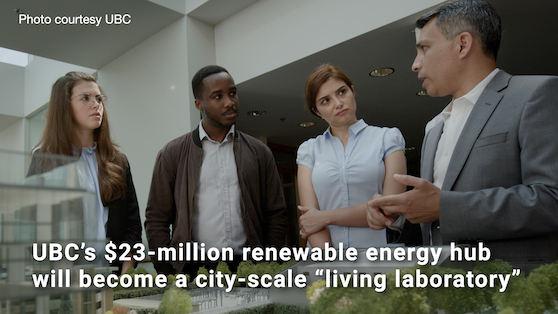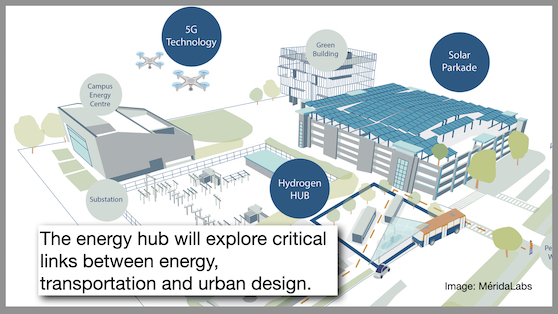
Cleantech
Electrified Transport
Features
News
News
Cleantech
Energy & Power
Energy Storage
Generation
News
Renewables
UBC’s $23-million renewable energy hub will become a city-scale “living laboratory”
July 8, 2021 | By Anthony Capkun
 Dr. Walter Mérida (far right) with students. Photo: UBC.
Dr. Walter Mérida (far right) with students. Photo: UBC. July 8, 2021 – A new, $23-million renewable energy hub will transform an entire city block at the University of British Columbia into a smart energy district, which will include the province’s first-ever hydrogen refuelling station for light- and heavy-duty vehicles.
“This is an exciting moment for UBC,” said Prof. Santa J. Ono, university president and vice-chancellor, adding the university is “truly grateful to our partners in government and industry who helped bring it to life.”
The project is supported by BC’s Ministry of Energy, Mines & Low Carbon Innovation, which announced $5.6 million in low-carbon fuel standard credits for the project.
“B.C. is well-positioned to become a world leader in clean energy, and this project demonstrates the excellent potential right here in the Lower Mainland,” said Minister Bruce Ralston.
Other funding was provided by the Canada Foundation for Innovation, BC Knowledge Development Fund, Natural Resources Canada (NRCan), Western Economic Diversification Canada and industry partners.
The energy hub will become a city-scale “living laboratory” that explores critical links between energy, transportation and urban design, says project lead Dr. Walter Mérida, a professor of mechanical engineering who leads MéridaLabs in the faculty of applied science.

The energy hub will explore critical links between energy, transportation and urban design. Image: MéridaLabs.
A key feature is a water electrolyzer that uses electricity from the solar panels to split water into hydrogen and oxygen, resulting in “green hydrogen”. The process does not emit carbon emissions.
The project will also include:
• A solar array to simulate power generation in realistic urban environments.
• Reversible EV charging, where energy can potentially be exchanged between electric vehicles and the grid. This highlights how buildings and cars can evolve from passive assets that sit unused for most of the day to active participants in smart energy storage transactions, says UBC.
• Smart energy storage enabled by aggregating the combined battery capacity of electric vehicles.
Hydrogen and clean electricity provide a clear path to sustainable, low-carbon economies for Canada and the world, says Mérida. “When combined with digital technologies, they can enable economic growth as transportation, telecommunications and civil infrastructures become smart and interconnected.”
The EV charging stations have been installed and will be operational by the end of the summer. The hydrogen refuelling centre is scheduled to open March 2022, followed by the commissioning of the solar array in October 2022.
“Ultimately, the test bed will link technology and people. It will provide a space to gather, engage and think deeply about the way we want to live,” added Mérida.
This feature—plus more great content—also appears in the February 2022 edition of Electrical Business Magazine. Back issues are located in our Digital Archive.
Print this page